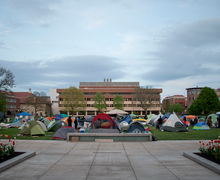#MeToo creates strength in numbers in fight against sexual harassment and assault
Lucy Naland | Presentation Director
#MeToo challenges the unspoken culture of sexual violence.
Me too.
These two words, which mean little at first glance, are now laced with the personal horrors of sexual harassment, assault, domestic violence and rape. A multitude of women whose voices, silenced by their assaulters, ring out in hoarse whispers.
Me too.
The phrase is a cry of anger, anguish and rage from the men and women whose assaults have been reduced to mere talking points: What they were wearing, how much they’d been drinking, who they were flirting with. “They were asking for it” sounds like the crack of a whip, turning victims into perpetrators.
Me too.
Two words, symbolic of the people who have been reduced in society’s eyes to statistics, political talking points that dance around the concept of sexual violence while doing nothing to prevent it.
The “Me Too” movement went viral in the wake of many actresses, including some of Hollywood’s leading women, accusing film executive Harvey Weinstein of sexual assault. Weinstein is the latest example of a powerful and wealthy man taking advantage of his immense social agency to abuse women. The “Me Too” movement, started by actress Alyssa Milano on Sunday night, has since been used millions of times on Facebook and Twitter alone.
If you’ve been sexually harassed or assaulted write ‘me too’ as a reply to this tweet. pic.twitter.com/k2oeCiUf9n
— Alyssa Milano (@Alyssa_Milano) October 15, 2017
The responses, which detail personal experiences of assault, harassment and rape, emphasize the culture of sexual violence we live in.
The viral campaign was not only intended to draw attention to the rape culture normalized by society and particularly by men in power. It also acts as a source of camaraderie and unity for the people who have lived in fear of speaking out about their experiences at the risk of being shamed or belittled.
As someone who has experienced sexual harassment and stalking, I felt the magnitude of this campaign echo to my core. My experience, one that I had struggled with and had felt guilt and blame for, no longer made me feel ashamed.
It made me angry. It made my heart ache. And it also made me believe in change.
Viral campaigns like “Me Too” have the power to give us strength in numbers. When those numbers add up to millions, we take power from the abusers and rightfully return it to survivors. It is through these forms of social acts and proactive change that we begin to heal.
FYI here’s how #MeToo has spread across the world. You can track the hashtag for free here https://t.co/n2LjeLbJ46 pic.twitter.com/HdXa2ZzAK1
— Talkwalker (@Talkwalker) October 17, 2017
We live in a culture where the Harvey Weinsteins and Woody Allens, the Roger Ailes and the Donald Trumps of the world can abuse and assault women and have their actions be reduced to “mistakes” and “locker room talk.” Society has attempted to make the threats of grabbing a woman by her genitalia or coercing her to watch a man shower to secure a job seem commonplace.
There is nothing commonplace about assault and rape. Sexual assault is not about intimacy or romance. It comes from a place of violence, anger and hatred — an incessant need for power and abuse of those deemed inferior.
But when millions of people come together to create a sense of support and agency for all those victimized by assault, there is nothing inferior about that.
Everyone should be able to live with the peace of mind that their safety is not a privilege, but a guarantee. When we know that as our truth, we know that change is possible. Millions of people believe that the time for this cultural change is now.
Me, too.
Kelsey Thompson is a junior magazine journalism major. Her column appears biweekly. She can be reached at [email protected].
Published on October 17, 2017 at 11:10 pm




